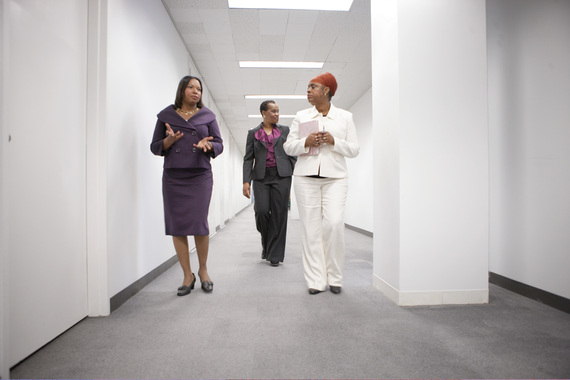Throughout the past 16 years, I've seen many qualified women come through our doors who are simply passed over in the job market, judged on external factors rather than on their experience and capability. One of our clients, Sheba, came to us with an impressive resume and a long career working in nonprofits and human resources. But in 2009 she was unexpectedly laid off from her job and has spent the last six years trying to navigate her way back into the workforce. Employed steadily since she was 17, Sheba's now in her 50s and reaching her prime earning stages but subsequently receiving little interest from employers. Unfortunately, her story is not unique. Many women in their late 40s and early 50s are being pushed out of the workforce during what should be the height of their careers.
Since the recession in 2009 there are about one million fewer women ages 45-54 in the workforce. But these women are not leaving by choice. In fact, a recent study by Pew Research shows that middle-aged to older women value a high-paying career as much as men while younger women value a career more than men.
Yet despite ambition women are still seemingly "retiring" earlier than men. According to the American Time Use Survey, only 55 percent of women ages 55-64 are still employed, compared to 64 percent of men the same age. And it's not just women's career aspirations that have changed; we also have the credentials to back it up, attending more schooling than men overall. Women are still falling through cracks in the system every day, part of a lost generation who are too young to retire but seemingly too old to be marketable in the workforce.
Unfortunately, Sheba and many other hardworking women her age have little control over the structural and cultural factors that have left them out of work for years. Though some see it as antiquated, ageism is a real factor for many women I see, especially those who fall into the "middle-age" bracket and find themselves subject to stereotypes. In fact, at Dress for Success our largest demographic falls within this range. Middle-aged women are being passed over in the job market, perceived as out of touch and even less productive than younger applicants. Rather than face years of struggle with unemployment or settle for below-living wages, many of them look to retirement so they can at least reap the benefits of their 401(k) or other security funding.
However, this path should not be their only option, and it's not even a viable option for many, since women are generally still paid less than men. We earn less over our lifetimes and are subsequently left with smaller pensions and assets. And with longer life expectancies than men, we are forced to live on less for longer, making us twice as likely to live below the poverty line after retirement.
But stereotypes are not the only hurdles these women encounter. As our health care improves, we are all living longer, but this shift has also positioned many women to sacrifice their prime earning years to serve as caregivers to sick and elderly parents. Others are stretched even thinner, caring for their own children, who are now living at home longer, as well as an elderly parent. And with more and more women as single breadwinners, I've seen many struggle to take on the extra burden of finding an income large enough to support more than one household.
Despite the shifting attitudes and career progress for women, society still lacks the structure to support senior women in the workforce. Until we can create a system that will incentivize women to care for both their families and careers, we need to offer more services to give older women opportunities to utilize their experiences and skillsets in the workforce.
Shortly before she was laid off, Sheba was looking to move up in her career and came to Dress for Success to join our programs and improve her interviewing skills. She wasn't receiving any feedback from employers, and, like many women we work with, she found it difficult to market herself. When she suddenly lost her job, Sheba's lack of confidence was further complicated by gaps in her resume. After joining our Going Places Network by Walmart, Sheba participated in mock interviews and career counseling and learned to understand her resume as part of her own narrative.
As we age, we experience a change in perspective that causes some of us to readjust our career paths to find new means of fulfilment. Speaking with our career experts, Sheba decided to explore other options and go back to school. Attending college part-time, allowed her to still care for her elderly father. Now with a better idea of how to tell her story, Sheba is able to speak to her job experience as a part of "her brand" and is comfortable communicating her skill set to employers, even landing a work-study job while in school.
A recent graduate, she holds a degree in business administration and is currently enrolled in a certificate program for non-profit management. Like many of the women who come through our doors, Sheba lacked options but not ambition. With more services available to middle-age and mature generations, these women could regain the confidence and skillsets needed to overcome structural and cultural barriers that have left them prematurely displaced. Society as a whole would benefit from a new generation of untapped experience, bringing flexibility and productivity to the workforce.
